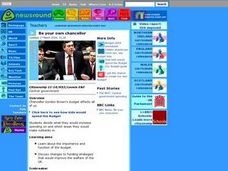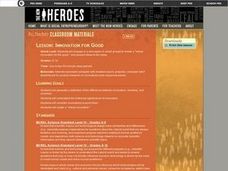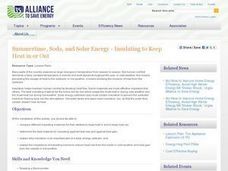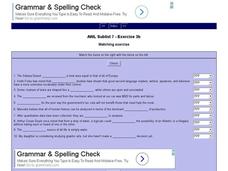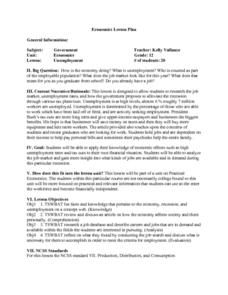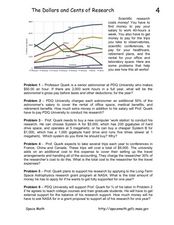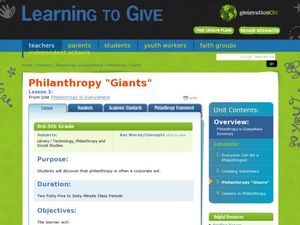Curated OER
Be Your Own Cahncellor
Students analyze the funding strategies of a modern central government. Individuals or groups construct a plan for increasing spending and making cutbacks in various government programs. Students examine the importance of taxes on the...
ProCon
Social Security Privatization
Should Social Security be privatized, or is the government program fine just the way it is? Scholars read pro and con arguments and watch videos to learn more about the debate topic. Pupils also have an opportunity to interact with other...
Council for Economic Education
Federal Budget Lesson Plan and Fiscal Ship Student Game
The federal budget has never been so fun! Using an interactive game, high schoolers choose from a variety of policy options after identifying goals and try to balance these changes in policy with a federal budget.
Curated OER
Powers of Congress
Have your class fill out this comprehension sheet while reading about the powers of Congress. There are ten multiple choice questions focused on the rights, powers, and limitations of Congressional law.
ProCon
Illegal Immigration
Should immigrants who illegally reside in the United States be eligible for citizenship? With information about undocumented immigrant population estimates, sanctuary cities, and unaccompanied immigrant children, pupils consider the pros...
Curated OER
Innovation for Good
Many historical innovations were created for the common good. Get your students ready for life as a critical thinker with this lesson which defines the differences between innovation and invention. They will conduct Internet research,...
Curated OER
Inflation and Money
Learners define money in terms of its functions and refer back to discussion of markets and the role of money in reducing transaction costs. They give examples of types of money.
Curated OER
What's a Good Job?
Upper graders almost always stress about life after high school. To ease the transition to adult life, discuss how to select a job to meet personal needs. Two writing prompts are included to help learners consider what they'd like to do...
Curated OER
Insulation: Keeping Heat In or Out
Students compare different materials on their ability to insulate. They identify the best materials for keeping heat in and keeping heat out. They also examine the importance of insulating homes.
Curated OER
Window Treatments for Energy Savings
Young scholars participate in an activity in which they determine which rooms are the warmest and coldest and explain why that is the case. They identify the types of energy saving window treatments and list their advantages and...
Curated OER
The Formation of Fossil Fuels
Students participate in an activity in which they explain the difference between renewable and nonrenewable sources of energy. They discover why the supply of fossil fuels is limited and practice using new vocabulary.
Curated OER
What Does It Cost to Use It?
Students investigate how electrical usage is counted. In this electricity lesson, students research an electric bill and define terms such as watts and kilowatts. Students calculate the average electricity cost per year by using a...
Curated OER
Cost Effective Buying
Students evaluate energy-related purchases. In this consumer awareness lesson, students visit an appliance store and rank the products' cost effectiveness by using a mathematical formula.
Curated OER
English Vocabulary Skills: AWL Sublist 7 - Exercise 3b
In this online interactive English vocabulary skills worksheet, students answer 10 matching questions which require them to fill in the blanks in 10 sentences. Students may submit their answers to be scored.
Curated OER
Federalism and the Division of Power
Test your U.S. history class on what they know about Federalism and the division of power. There are 5 matching and 5 multiple choice questions to solve. Questions relate to the American federal system, US Constitution, national...
National Center for Case Study Teaching in Science
To Boldly Go, or Not
Here is a different way to combine social studies and science. Have your high schoolers read a passage about the 2004 vision for space exploration and then discuss the practicality, costs, and reasons for returning to the moon. Then, the...
Curated OER
Reading A Pay Stub
Students complete the included activity sheet related to reading a pay stub and calculating deductions. Once the activity sheet has been checked, students demonstrate their knowledge of the vocabulary associated with the lesson through...
Curated OER
Unemployment
Twelfth graders evaluate the state of the economy and develop a definition for unemployment. In groups, they read an article about how the economy affects society and discuss how it affects them. Individually, they research the types...
Curated OER
Budget Worksheet
For this student budget worksheet, students fill in their incomes as well as their individual payments per month to chart where their money goes each month.
Curated OER
The Dollars and Cents of Research
In this cost o research worksheet, students calculate the costs to pay professors to do research, they determine the costs for equipment needed for research and they calculate the amount of money needed to support research through...
Curated OER
Philanthropy "Giants"
Young scholars report on the activism of corporate philanthropists. In this service learning lesson, students research companies that operate as philanthropists and identify their recipients.
Curated OER
Security and Savings for All?
Students act as either Democrats or Republicans to debate plans to alter Social Security. For homework, they consider whether Social Security has become too politicized and propose their own solutions.
Curated OER
Biologically Altered (B/A Fish)
Learners complete a variety of activities as they examine the ethics involved in biologically altering fish. They hold a mock town meeting in which they determine whether or not a transgenic aquaculture should be allowed to locate in...
Curated OER
Immigration Policy: Past and Present
Students examine the history of the United States' immigration policy. They identify events in history that changed policies regarding immigrants. They discuss new possible legislation as well.


